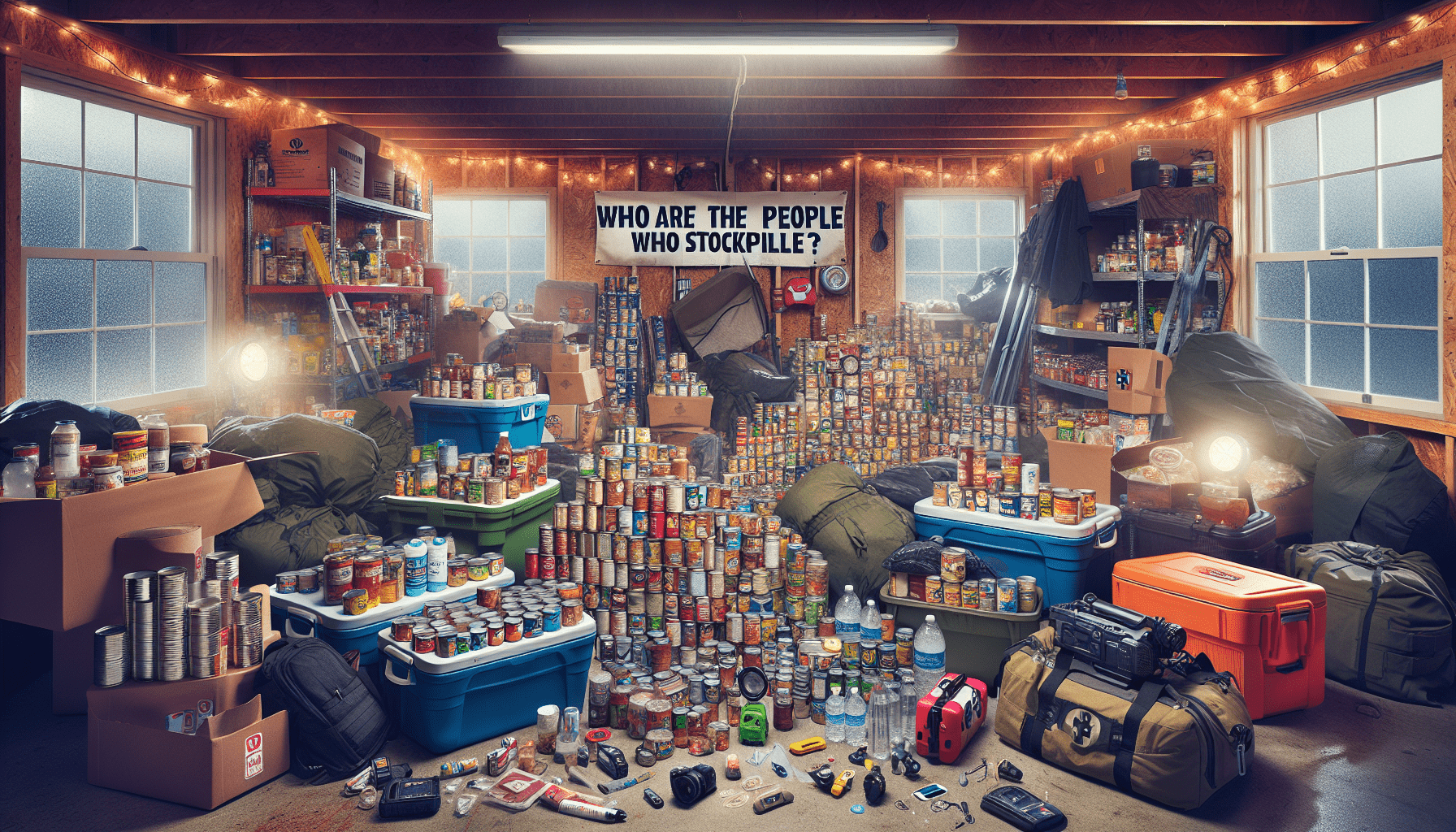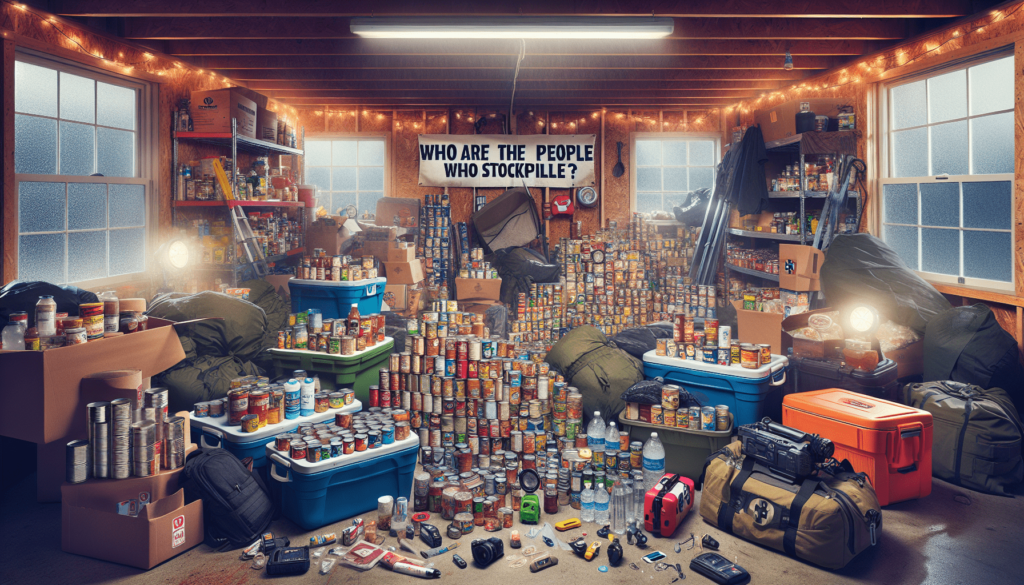
Have you ever wondered why some people are obsessed with stockpiling? I asked myself this question recently, and it led me down a rabbit hole of fascinating facts and sometimes peculiar human behavior. The image of someone hoarding canned goods and toiletries in the back of a dimly-lit basement often comes to mind. It’s like something straight out of a post-apocalyptic movie where people prepare for the end of the world. But what drives this behavior in real life?
The stockpiler, as we might label them, can be anyone—your neighbor, a coworker, or even a family member. Today, I invite you, my reader, to join me as I explore the world of stockpilers. Who are these people, really, and why do they do what they do?

Understanding Stockpilers: Profiling the Behavior
Everyone has a penchant for collecting things—shoeboxes, vintage records, stamps. However, the art of stockpiling taps into a deeper psychological space. Generally, stockpiling involves accumulating goods, often essentials, in quantities beyond immediate need.
A Personal Insight: Why Do I Stockpile?
I find this phenomenon incredibly relatable. Have I ever strayed down the grocery aisle and thought, “You can never have too much pasta”? Absolutely. That said, my runaway trolley can’t equal the full-scale nature of stockpiling. The desire stems from a potent mix of psychology, upbringing, and that human vulnerability to fear. Some strive for control over their environment, while others are influenced by a post-war mentality, passed down generations, that stockpiling equals safety.
The Motivation: Safety Net or Simple Anxiety?
So why do people stockpile? Is it an inherent need for security? Maybe it’s a response to anxiety stemming from uncertainty—political unrest, economic fears, or looming natural disasters. For some, it’s a way of life, deeply embedded in their routine. How can I forget the early days of the pandemic when toilet paper became more precious than gold? That mass panic-buying, my friend, was a universal peek into the mind of a stockpiler.
Stockpiling Throughout History
Although we perceive stockpilers as modern-day hoarders, the act is as old as time itself. History shows us that stockpiling has roots stretching back centuries, often tied to times of war or crisis. Medieval castles piled grains in their pantries, Roman soldiers had supplies stashed for campaigns, and more recently, WWII led to widespread rationing, sparking a culture of stockpiling.
The Types of Stockpilers
Just as we are all not alike, stockpilers come in various types, each with unique motivations and methods. Let us unravel these distinct personalities.
| Type | Characteristics |
|---|---|
| The Prepared Parent | Focuses on stocking essentials for family needs, often including food and personal care items. |
| The Survivalist | Is ready for any apocalyptic scenario, often accumulating gear like tools, canned goods, and alternative energy sources. |
| The Bargain Hunter | Accumulates items because of perceived value in bulk deals, driven by the principle of “more for less.” |
| The Homesteader | Sustainably stockpiles through self-sufficiency, often raising their own livestock or cultivating vegetable gardens. |
The Prepared Parent
Are you someone who buys extra diapers “just in case”? The prepared parent often stacks their pantry high for their family. Their motivation usually circles around safety and necessities for loved ones. Speaking from experience, the peace of mind that comes with being ready for an unexpected sick day or a snowstorm is immense.
The Survivalist
When I think of survivalists, I picture someone with a bunker. Survivalists, indeed, are a subset of stockpilers readying themselves for absolute worst-case scenarios. Their stock often includes non-perishables, medical supplies, and other essential survival items.
The Bargain Hunter
And then there are those who simply can’t resist a good deal. The thrill of the chase. Imagine buying ten cans of beans at half price, even if you wouldn’t touch them with a ten-foot pole otherwise. This investment mindset strongly influences bargain hunters to stockpile anything from groceries to cleaning products.
The Homesteader
On a different spectrum, homesteaders epitomize a kind of stockpiling reliant on self-sustainability, typically involving agriculture and animal husbandry. This lifestyle-driven stockpiling ensures that they can thrive off their own land when necessary.
Psychological Perspective: What’s Driving Them?
It’s tempting to dismiss stockpiling as eccentric, but psychology plays a huge role. It’s a dance between fear and security, driven by daily anxieties as much as personal upbringing.
Psychological Drivers
Behind every stocked shelf lies a unique psychological driver. For many, stockpiling offers a sense of control in an unpredictable world. Others see it as a coping mechanism for anxiety or a strategy to counter scarcity.
Fear of Loss
Some of us fear scarcity—known technically as “fear of loss bias”. Stockpilers take this fear to heart, preparing against any circumstances where resources might be short. It’s that nagging voice that questions if the sky is indeed falling.
Family Background and Cultural Influences
Stockpiling can also be a learned behavior. If your parents or grandparents lived through economically tough times or even wars, their emphasis on resource preservation could trickle down to you. Many families have unspoken ‘rules’ about maintaining a pantry filled with essentials.
The Impact: Economic and Social Effects
Stockpiling is an individual venture, but its ripple effect touches economies and communities.
Economic Consequences
On a larger scale, mass stockpiling can distort supply and demand balance, affecting prices in volatile ways. Remember the spike in prices during market shortages? These economic gyrations underline how personal stockpiles impact a global stage.
Hoarding vs. Stockpiling: A Social Take
Where’s the line between stockpiling and hoarding? Hoarding goes a step further into psychological territory, often leading to clutter and health hazards. Stockpiling, for most, remains methodical and purposeful, hinging more on the intention of use than accumulation.

How Do They Do It? Strategies Involving Time and Space
Ever wondered where all these items go? Stockpilers are often very organized, employing strategies to maximize storage and utilize time effectively.
Time Management
Stockpilers need a sharp sense of timing. Sales and seasons don’t wait, and strategic planning fills gaps in personal inventories. Tracking expiration dates and rotation is essential for maintaining a usable stockpile.
Efficient Space Utilization
Space, as one can imagine, is a finite resource in any household. Stockpilers employ creative solutions—storing jars under stairs, converting garages into mini-warehouses, or using vacuum-sealed bags to compress storage needs.
Lessons from Stockpilers: Preparedness and Prudence
Stockpiling, while peculiar, offers a few lessons in preparedness and financial prudence.
Preparedness as a Lifestyle
The idea of being prepared isn’t inherently a bad trait—it equates to a form of strategic foresight. Some people walk us through their variety of home-packed goods, much like showing off souvenirs of wisdom achieved through strategic gathering.
Prudence Amidst Uncertainty
Strategies of stockpiling underline prudence amidst today’s uncertainties. By buying smart, one can save money and limit waste—though one must tread the line carefully to avoid excessiveness.
An Unfolding Tale
As we navigate through my musings on stockpiling, I find it an endlessly intriguing aspect of human behavior. Despite the fascination with labels, ascribing judgment to stockpilers is complicated. Their actions play a substantial role in their personal narratives, a balancing dance between excess and necessity.
Embrace or Question?
Stockpilers may indeed seem eccentric. Yet, in our multiples of carted goods, are we not seeing a reflection of ourselves or even a primitive ritual of safety and survival? Food for thought, as someone might say, hopefully from a well-stocked pantry.
Reflecting on stockpiling and the stories within presents a tapestry of humanity in its anxieties, simplicities, and peculiarities. So, next time you’re in the grocery store and overhear someone mention that you “just can’t have too many cans of tomatoes,” know that there may be a little stockpiler in all of us, navigating the world as best they can.
